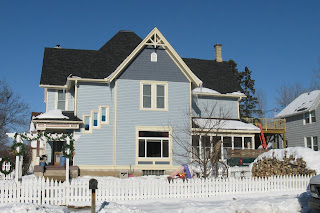 This blog is part of our anniversary celebration series, highlighting NeighborWorks affiliates celebrating milestone years marking either their membership in the network or
their incorporation as an organization. Last month, Asian Americans for Equality, Inc. (AAFE) celebrated 5 years as part of the NeighborWorks network.
This blog is part of our anniversary celebration series, highlighting NeighborWorks affiliates celebrating milestone years marking either their membership in the network or
their incorporation as an organization. Last month, Asian Americans for Equality, Inc. (AAFE) celebrated 5 years as part of the NeighborWorks network.  |
| By Brittany Hutson, NeighborWorks America Public Relations fellow |
Christopher Kui, executive director, describes AAFE as a “unique” and “innovative” organization. In the late 1980s, AAFE became the first community development corporation to introduce the low income tax credit in New York City, demonstrating the organization’s willingness to think outside of the box. “We introduced the low income tax credit at a time when no one else did [it] or thought highly of it,” explains Kui. “It was validation that investing in affordable housing benefits everyone in the community,” he says of Equality Houses, two buildings AAFE purchased for temporary and permanent low-income housing.
 |
| AAFE's history includes calling attention to the needs of New York's Chinatown residents |
One element of AAFE's work is housing preservation in Chinatown. The organization developed a program with New York City to purchase historical tenement buildings off the private real estate market so that the buildings could be preserved as permanent affordable housing.
Additionally, AAFE has two community development financial institution (CDFI) affiliates: the AAFE Community Development Fund provides first time homebuyers with homeownership counseling and low interest loans; and the Renaissance Economic Development Corporation provides technical assistance and low interest loans to women and minority-owned small businesses.
 |
| A Chinatown senior at a Columbus Park beautification project |
Following Superstorm Sandy this past October, AAFE dispersed over 160 emergency repair loans amounting to $3 million to impacted homeowners and small businesses. “The most gratifying part of being at AAFE is seeing how quickly we respond,” says Kui. “AAFE was able to launch this emergency loan program two days after the storm and was able to get funds released quickly to help homeowners and businesses get back on their feet.”
Kui adds that one of the organization’s biggest barriers is helping to educate underserved minorities about their basic rights. “Recent immigrants are scared about bringing up problems they may have due to the language barrier and fear of the government,” he says. “That’s why AAFE’s work is very important because we continue to educate people about their rights, advocate for resources to improve our community, and promote affordable housing.”
In its fifth year as a NeighborWorks member, AAFE not only receives capital from NeighborWorks America but also resources that support the organization’s mission. “NeighborWorks pushes us to be the best organization that we can be,” says Kui.










